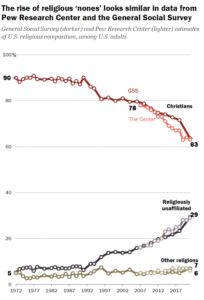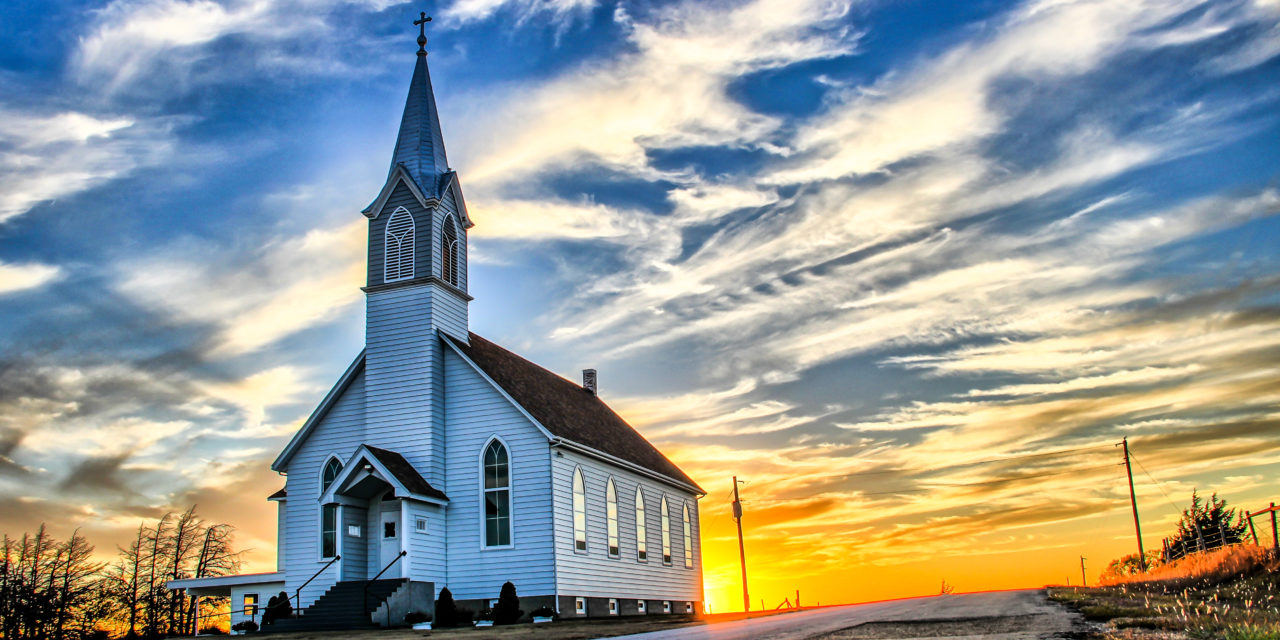New Survey
An increasing number of young adults say they believe in a higher power, a new study has found.
According to an annual report from the Springtide Research Institute, “About one-third of 18-to-25-year-olds say they believe – more than doubt – the existence of a higher power.” This is “up from about one-quarter in 2021,” the report found.
The Wall Street Journal, in an article on the new report, attributes the findings to the effect that the COVID-19 pandemic had on young Americans.
“For many young people, the pandemic was the first crisis they faced,” The Journal notes. “In many ways, it aged young Americans and they are now turning to the same comfort previous generations have turned to during tragedies for healing and comfort.”
While it is interesting that an increasing share of younger Americans are turning to faith to find hope, is this news truly something to celebrate?
Many of these young adults finding faith would likely classify themselves as “spiritual, but not religious.” In other words, they have some sort of belief in a higher power, but that belief doesn’t always translate into church attendance; much less an assent to a set of doctrines and moral values that make demands upon their consciences.
Consider Desmond Adel, who The Journal interviewed and describes himself as an “agnostic theist,” and “leans towards” the existence of a god, but “[not] like any Gods described by major religions.”
Alora Nevers, a 29-year-old mom of four, told The Journal that she believes in God, because if she didn’t, “it would send me into a spiral of ‘What ifs,’ things that I would rather not get into.”
But Alora doesn’t attend church, saying, “I would rather praise God the way I do with my family.”
Moralistic Therapeutic Deism
In his book Souls in Transition, sociologist Christian Smith first used the term “Moralistic Therapeutic Deism” to describe the religious beliefs of many U.S. young adults.
Those who affirm this psychology generally believe in a god who wants people to be happy and nice to one another. They’re far less concerned with historical religions, Christian traditions and particular doctrines that make demands upon their lives.
Moralistic Therapeutic Deism certainly seems to describe the individuals quoted above who are turning to “faith,” but not necessarily turning to the historic Christian God. Rather, they are turning to an over-personalized, subjective, and relative “god” whom they get to create, not one who created them.
When viewed through this lens, perhaps Americans’ post-pandemic turn towards “faith” isn’t all it might seem to be.
The State of Christianity
But what really is the state of religion in America today?
The answer to that question is likely more nuanced than you may have been told.
According to large, generally reputable polling firms like Pew Research Center, self-reported religion in the traditional sense is on the decline.
Pew reports that the number of U.S. adults who identify with Christianity has declined from 78% in 2007 to 63% in 2021. At the same time, the number of adults who claim “no religion” increased from by 13-points from 16% to 29% in those 14 years.

Photo Credit: Pew Research Center
Pew also found that while those who identify as Catholic has generally held steady, the share of Americans who identify as Protestant has declined from 52% in 2007 to 40% in 2021.
Additionally, according to Pew, “24% of U.S. adults describe themselves as born-again or evangelical Protestants, down 6 percentage points since 2007.”
However, Glenn T. Stanton – director for Global Family Formation Studies at Focus on the Family – makes a critical points in his book, The Myth of the Dying Church.
He notes that much of the reason for the apparent increase in secularization among American adults is because those who previously identified with a religious denomination, but really had no deep faith, are now reclassifying themselves as “nones.”
Stanton writes:
[The nones] rise is not because of some great secularizing upheaval in American’s faith beliefs and practices. They are simply reporting their actual faith practices in more candid ways.
[The nones] are simply those who until recently would have identified with a Christian denomination just because that’s what their family has always been.
In this way, the increase in those who claim no religious faith is nothing new. Rather, it’s a new insight into old religious practices and behaviors.
Conclusion
It’s good that some young Americans are becoming more open to “faith” in a general sense. But it’s not sufficient, especially to the extent that Americans are turning to faith for a sense of “comfort.”
Make no mistake, believing in a God who cares for humankind and loves us unconditionally can be comforting, but belief for “comfort” sake is not enough.
No one should believe in something or someone because it makes them comfortable. They should believe in something because it is true.
And thanks be to God, we can know through divine revelation and historical evidence that Christianity is true; God has revealed Himself to us in the person of Jesus Christ.
Homicide detective J. Warner Wallace recently appeared on the Focus on the Family Broadcast to discuss the evidence for the historicity and deity of Jesus Christ. To listen to his broadcast, “The Proof You Need to Believe in Jesus Christ,” click here.
Additionally, you can check out a copy of Wallace’s most recent book, Person of Interest, here.
Related articles:






